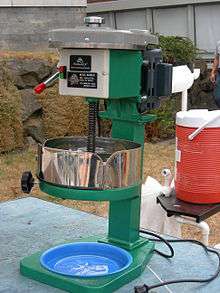Shave ice
|
Li-Hing & Lychee ice shaved from crack seed shop in Hilo, Hawai'i | |
| Type | Frozen dessert |
|---|---|
| Main ingredients | Ice, syrup, condensed milk (common variant) |
Shave ice or Hawaiian shave ice is an ice-based dessert made by shaving a block of ice. While the product can resemble a snow cone, snow cones are made with crushed, rather than shaved, ice.[1] On the Big Island of Hawai'i, it is also referred to as 'ice shave', though both terms (ice shave and shave ice) are used by locals.
Shaving produces a very fine ice that appears snow-like. Flavored syrups are added to the ice, which are absorbed by the ice instead of surrounding it.[2][3] A properly made shave ice product rarely requires a straw, since the flavors are in the ice and not at the bottom of the cup. Although the traditional American flavors are common, shave ice in Hawai'i is often flavored with local ingredients such as guava, pineapple, coconut cream, passion fruit, li hing mui, lychee, kiwi fruit and mango. Hawaiian shave ice is traditionally served in a conical paper or plastic cup with multiple flavors and with a scoop of vanilla ice cream and/or adzuki bean paste at the bottom of the cup. Sweetened condensed milk drizzled over the top is sometimes called a "snow cap". This style of shave ice is common on the north shore of O'ahu, as well as on Maui and the Big Island of Hawai'i (where it is called "Japanese style").
History
Shave ice has its origins in China, as early as the 7th century AD.[4]
It was imported to America by Japanese immigrants. Japanese immigrants brought it along with them when they came to Hawaii to work in sugar plantations. After the left plantations, they took up new professions. But by then Shave Ice & Snow cones had become immensely popular and part of Hawaiian culture.
In other countries
"Snow ice"—cream, milk, water, sugar and fruit, frozen and then shaved and served in cones—is popular in China, Korea, Taiwan and Indonesia and making inroads into the United States.[5]
- Brazil – Raspadinha
- Bangladesh – Gola
- Cambodia - Teuk Kork Chus (ទឹកកកឈូស)
- Colombia – Raspado
- Costa Rica – Copos and also called Granizado
- Cuba – Granizados
- Dominican Republic – Frío Frío and also in some parts of the country they are called Yun Yun
- El Salvador – Minuta
- France – Granité Hawaïen
- Guatemala – Granizada but in other parts of the country they are also called Raspado
- Guyana – Crush Ice or Snow Cone and are topped with condensed milk.
- Haïti – Fresco
- Italy – Granita, Grattachecca
- India – Chuski / baraf ka gola
- Taiwan – Baobing There is also a version known as snow flake ice which uses shaved frozen milk and other flavors.
- Japan – Kakigōri
- Korea – Patbingsu
- Mexico – Raspado, Yuki (only in northern Mexico)
- Nicaragua – Raspado
- Peru – Raspadilla
- Philippines – Halo halo
- Puerto Rico – Piragua
- Malaysia, Singapore and Indonesia – Ais/Es kacang
- Pakistan, Baraf ka Gola
- Panama – Raspao, often topped with sweetened condensed milk
- Suriname – Schaafijs
- Cambodia – Tuk Kak Chhous, ទឹកកកឈូស
- Thailand – Nam khaeng sai
- English and French Caribbean islands – Snowball
- Colombia – Raspado or Cholado
- United States – Shaved Ice/Snowball/Snoball, especially in Baltimore, Maryland and New Orleans, Louisiana
- Honduras – Minuta, often topped with sweetened condensed milk
- Mauritius – Glaçon Rapé
- Canada



See also
References
- ↑ Mike Gordon (2006). "Honolulu Advertiser". Shave ice. Retrieved 2013-09-04.
- ↑ Linda Stradley (2004). "Hawaiian Shave Ice". What's Cooking America. Retrieved 2010-06-12.
- ↑ "History of Snow Cones". ePopcorn.com. Archived from the original on 2010-06-28. Retrieved 2010-06-12.
- ↑ "The Americanization of Bao Bing, a Cool, Fruity Asian Treat". The New York Times. 1989-06-07. ISSN 0362-4331. Retrieved 2017-09-23.
- ↑ Thomas Rogers (2010-06-15). "Will "Snow Ice" be the next Pinkberry?". Salon. Retrieved 2010-06-16.
6. Ricard Parker (2018) "History of snow cones & shaved ice" Best ice-shaver
| Wikimedia Commons has media related to Hawaiian shave ice. |